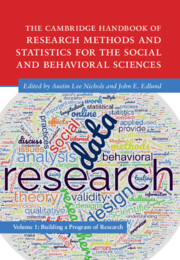 The Cambridge Handbook of Research Methods and Statistics for the Social and Behavioral Sciences
The Cambridge Handbook of Research Methods and Statistics for the Social and Behavioral Sciences Book contents
- The Cambridge Handbook of Research Methods and Statistics for the Social and Behavioral Sciences
- Cambridge Handbooks in Psychology
- The Cambridge Handbook of Research Methods and Statistics for the Social and Behavioral Sciences
- Copyright page
- Dedication
- Contents
- Figures
- Tables
- Contributors
- Preface
- Part I From Idea to Reality: The Basics of Research
- 1 Promises and Pitfalls of Theory
- 2 Research Ethics for the Social and Behavioral Sciences
- 3 Getting Good Ideas and Making the Most of Them
- 4 Literature Review
- 5 Choosing a Research Design
- 6 Building the Study
- 7 Analyzing Data
- 8 Writing the Paper
- Part II The Building Blocks of a Study
- Part III Data Collection
- Part IV Statistical Approaches
- Part V Tips for a Successful Research Career
- Index
- References
8 - Writing the Paper
from Part I - From Idea to Reality: The Basics of Research
Published online by Cambridge University Press: 25 May 2023
- The Cambridge Handbook of Research Methods and Statistics for the Social and Behavioral Sciences
- Cambridge Handbooks in Psychology
- The Cambridge Handbook of Research Methods and Statistics for the Social and Behavioral Sciences
- Copyright page
- Dedication
- Contents
- Figures
- Tables
- Contributors
- Preface
- Part I From Idea to Reality: The Basics of Research
- 1 Promises and Pitfalls of Theory
- 2 Research Ethics for the Social and Behavioral Sciences
- 3 Getting Good Ideas and Making the Most of Them
- 4 Literature Review
- 5 Choosing a Research Design
- 6 Building the Study
- 7 Analyzing Data
- 8 Writing the Paper
- Part II The Building Blocks of a Study
- Part III Data Collection
- Part IV Statistical Approaches
- Part V Tips for a Successful Research Career
- Index
- References
Summary
Writing the paper is one of the most challenging aspects of a project, and learning to write the report well is one of the most important skills to master for the success of the project and for sustaining a scholarly career. This chapter discusses challenges in writing and ways to overcome these challenges in the process of writing papers in the social and behavioral sciences. Two main principles emphasized are that writing is (a) a skill and (b) a form of communication. Skills are developed through instruction, modeling, and practice. In terms of communication, the research report can be conceived as a narrative that tells a story. Sections of the chapter focus on identifying common barriers to writing and ways to overcome them, developing a coherent and appropriate storyline, understanding the essential elements of a research paper, and valuing and incorporating feedback.
- Type
- Chapter
- Information
- The Cambridge Handbook of Research Methods and Statistics for the Social and Behavioral SciencesVolume 1: Building a Program of Research, pp. 156 - 176Publisher: Cambridge University PressPrint publication year: 2023
